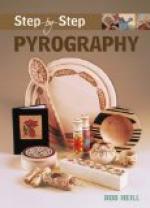The old woman’s brown withered face crinkled in a smile. “Trust you, Master Roger!” she muttered. “Come still.”
She hobbled around to the rear of the cottage and paused to draw aside a branch. Roger cautiously peered through the leaves, and a hiss like that of an angry snake sounded within.
“If I didn’t know it was a bird I should think there was a snake or a cross cat in there,” said Roger, after he had had a look at the small but spirited bird-mother. “What ever makes her do that, Mother Izan?”
Old Izan put out a gnarled hand to feed the titmouse a few live insects. “Same as an old woman don’t mind folk saying she’s a witch so they let her alone, mayhap,” she said. “You’d not reach your hand in there if ’twas an adder’s nest, I reckon.”
“I’m teaching Eleanor all the birds’ names,” went on Roger, quite at his ease, munching a bit of flag-root. “They don’t have the same names here that they do in Normandy, you know. Old Jehan—the gardener that used to know Eleanor’s grandfather—taught me all their names when I was there. The nuthatch is Pic Macon, and the mum-ruffin is Pendolin, and the robin is Marie-Godrie. I’m going to show Eleanor the nest next time we come, if you don’t mind.”
To the surprise of everybody old Izan rode up the castle mount one day on a borrowed donkey. “Howel he loaned it to me,” she explained dryly. “Seems like he has less fear of witches since little Gwillym began to fat up. I have secret things to speak of to my lord, Master Roger. Will ’ee take him word?”
In private, with only Sir Walter and Lady Philippa to hear, the old woman told her secret.
“‘Tis the Fairies’ Well that drags down your wall,” said she. “My grandfather told me the tale, and he had it from his father. The outlet is a hidden stream that runs underground to the river, and not the stream in the marsh as folk think. The underground channel goes under a corner of your mount. When the snows melt and the waters are strong in mountain and in valley, then rises the water in this channel, deep under the mount, and heaves at the rocks above it and throws down your wall. That is all the witchcraft of it. So long as ’twas your stones and battlements that fell I cared no whit, but when my lady told me that she would have her garden there I could not bear to think of the peril for her and the younkets. I am no witch, my lord, unless it be Satan that gives us to know more than others. But I have hated the Normans who came here to steal our land, and have helped my people to harass them in years gone by. All but you and Sir Hugh l’Estrange, they have despoiled and plagued the folk. But build no wall above the stream, for ’twill fall—’twill fall—’twill fall. The waters will pull it down.”
The knight sat thinking, his hands on the arms of his tall carved chair. “I am not so sure,” he said. “Maybe we can lift the curse on the mount and make the wall secure. You shall dwell in peace by your well so long as you may live, and your children after you, if you will show me where this channel goes and keep the secret. Tis in my mind that it is best to keep it secret still.”




